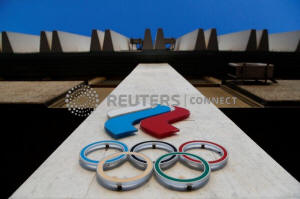Russia's sports officials cry foul
as WADA eyes four-year Olympic ban
 Send a link to a friend
Send a link to a friend
 [November 27, 2019]
By Gabrielle Tétrault-Farber [November 27, 2019]
By Gabrielle Tétrault-Farber
MOSCOW (Reuters) - Russian sports
officials on Tuesday spoke out against a World Anti-Doping Agency
(WADA) committee's recommendations that the country be banned from
the Olympics for four years, saying this was overly harsh and would
hurt sport there.
The recommendations, published on Monday, mean Russia could miss out
on the next two Olympic Games and world championships in a wide
range of sports.
WADA's independent Compliance Review Committee recommended the ban
after Moscow provided WADA with laboratory data that was found to
have been doctored.
"It's sad. I can only call these recommendations unfair," Umar
Kremlev, head of Russia's boxing federation, said in a statement.
"Russia plays an important role in the development of global sport.
How can such a country be banned?"

The committee's recommendations will be put to the agency's
executive committee in Paris on Dec. 9.
For Dmitry Svishchev, president of Russia's curling federation, the
country has already sufficiently been punished for its doping
scandals.
"These recommendations are harsh, baseless punishment for old
problems for which Russia has already been punished," he told
Reuters.
"Russia has made great progress in fighting doping. To punish the
next generation in such a harsh manner is too much."
Russian Foreign Minister Sergei Lavrov linked the recommendations to
what he called broader attempts by Western countries to reprimand
Russia.
"The more these types of decisions are made, the better it is... for
their anti-Russian argument," Lavrov said.
HOSTING EVENTS
Russia was banned by the International Olympic Committee (IOC) from
last year's Pyeongchang Winter Games as punishment for alleged
state-sponsored doping at the 2014 Sochi Olympics.
But some Russian athletes with no history of doping were cleared to
compete as neutrals.
Under the latest recommendations, some Russians without a history of
doping could be cleared to compete in major international events as
neutrals, as was the case in Pyeongchang.
[to top of second column] |

Logo of Russia's Olympic Committee is seen on its building in
Moscow, Russia November 23, 2019. REUTERS/Maxim Shemetov

The IOC said in a statement it welcomed the opportunity for clean
Russian athletes to compete, saying WADA did not indicate "any
wrongdoing by the sports movement in this regard, in particular the
Russian Olympic Committee or its members."
The committee also recommended barring Russia from hosting major
sporting events for four years, and moving major events for which
Russia has already won hosting rights elsewhere "unless it is
legally or practically impossible to do so."
U.S. Anti-Doping Agency (USADA) CEO Travis Tygart said in a written
statement that the latest recommendations from the WADA committee
were "inadequate".
"WADA must get tougher and impose the full restriction on Russian
athlete participation in the Olympics that the rules allow," said
Tygart.
"Only such a resolute response has a chance of getting Russia's
attention, changing behavior, and protecting today's clean athletes
who will compete in Tokyo, as well as future generations of athletes
in Russia."
Russia is currently set to host the 2023 men's world ice hockey
championships.
St. Petersburg is due to host four matches in the 2020 European
championships and was selected to host the Champions League final in
2021. These fixtures may not be affected by a new WADA ban as
European football's organizing body UEFA is not on its list of
signatories.
"Given that UEFA is not a WADA signatory and Russian soccer players
have not been caught doping, I am 99.9% certain that nothing will
happen with the Euro next year," parliamentarian Igor Lebedev, a
former member of the Russian Football Union's executive committee,
was quoted as saying by the Interfax news agency.
Russian President Vladimir Putin is set to meet UEFA President
Aleksander Ceferin in St. Petersburg on Wednesday.
(Reporting by Gabrielle Tétrault-Farber; additional reporting by
Anton Kolodyazhnyy in Moscow and Karolos Grohmann in Berlin; Editing
by Hugh Lawson and Ian Chadband)
[© 2019 Thomson Reuters. All rights
reserved.] Copyright 2019 Reuters. All rights reserved. This material may not be published,
broadcast, rewritten or redistributed.
Thompson Reuters is solely responsible for this content. |